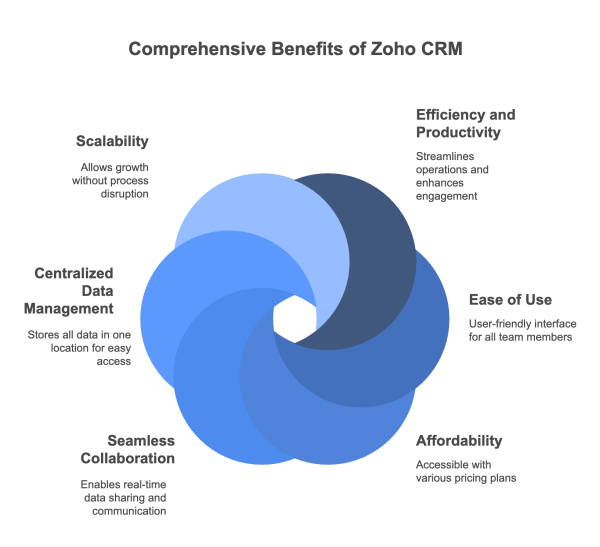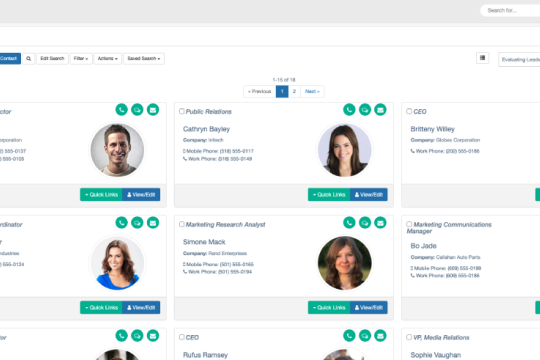When it comes to managing customer relationships, choosing the right CRM (customer relationship management) software is essential for driving sales, enhancing efficiency, and fostering business growth. As your business evolves, it’s crucial to have a CRM solution that can scale with your needs. Zoho CRM offers a robust suite of cloud-based tools designed to work seamlessly together.
In this review, we will explore the key features, pricing options, and benefits of Zoho CRM, providing you with the insights needed to determine if it’s the optimal choice for your organization. Read on to discover how Zoho CRM can elevate your business operations.
What Is Zoho?
Zoho is a versatile cloud-based software suite designed to streamline business operations across various domains, including sales, marketing, and customer support. Key features include automation tools that enhance efficiency, robust analytics for informed decision-making, and a strong emphasis on data privacy, ensuring user-generated information is never exploited for advertising. With customizable apps and seamless integration capabilities, Zoho enables businesses to concentrate on growth while managing their operations effectively and securely.
Setting up Zoho CRM
Setting up Zoho CRM can be a seamless experience if approached correctly. Unlike some other CRMs, Zoho CRM offers a more user-friendly interface, making it accessible even to those with limited technical skills. The implementation time can range from a few days to a few weeks, influenced by your specific business needs and resources. One of the significant advantages of Zoho CRM is its comprehensive onboarding process, which includes an extensive library of video tutorials and user guides to facilitate user education.
Additionally, Zoho provides a 15-day free trial for new users, allowing them to explore the platform’s features in depth. This trial is an excellent opportunity for businesses to assess whether Zoho CRM meets their requirements before fully committing to the subscription. We strongly encourage users to make the most of this trial period to ensure the best fit for their organization.
Design and Usability
Zoho CRM offers a sleek and user-friendly design that significantly enhances the user experience. With a modern interface that prioritizes usability, Zoho CRM is built around intuitive navigation, allowing users to easily access features and data. The dashboard is thoughtfully organized, presenting key information in a streamlined manner that minimizes cognitive load, enabling team members to focus on their tasks without unnecessary distractions.
One of the standout features of Zoho CRM is its adaptability across different devices and platforms. The design is responsive, ensuring that whether on desktop or mobile, users encounter a consistent and accessible experience. This flexibility is crucial for teams that need to stay connected both in and out of the office.
Moreover, Zoho CRM emphasizes accessibility, adhering to web content guidelines to ensure that all users, regardless of their technical proficiency, can navigate the platform effortlessly. With its clean layout and focus on user-centric design, Zoho CRM empowers teams to be productive and efficient in managing customer relationships, whether they are seasoned professionals or new users.
Customization Options
Zoho CRM offers extensive customization capabilities, allowing businesses to tailor the platform to their specific needs. Users can create and rename modules and add custom fields to capture essential data. This flexibility ensures the CRM aligns closely with company workflows and requirements.
In addition to customization, Zoho CRM features automation tools that streamline processes. Users can set up workflows to automatically trigger actions, such as sending emails or updating field values at specific deal stages, thereby reducing manual efforts and boosting productivity.
Integration Capabilities
Zoho CRM supports seamless integration with a variety of popular third-party applications such as G Suite, Microsoft Office 365, and QuickBooks. This feature allows users to sync data across platforms and leverage Zoho CRM’s capabilities alongside other tools they may already be using.
For businesses that require more advanced integrations or specific customizations, Zoho offers an open API (application programming interface) that enables developers to create tailored solutions for their organization.

Benefits of Using Zoho's CRM
The benefit of choosing Zoho CRM for your business is that it offers a comprehensive solution that streamlines operations and enhances customer engagement. By automating repetitive tasks and providing data-driven insights, Zoho CRM helps businesses improve efficiency and productivity. Additionally, its focus on user privacy ensures that sensitive information is not compromised.
Some other notable benefits of Zoho CRM include:
- Ease of Use: As mentioned earlier, Zoho CRM offers a user-friendly interface that makes it easy for all team members to navigate and use the platform effectively.
- Affordability: With various pricing plans available, including a free trial option, Zoho CRM is accessible to businesses of all sizes and budgets.
- Seamless Collaboration: Zoho CRM allows different teams within an organization to collaborate effortlessly by sharing data and updates in real-time. This feature fosters communication and enhances teamwork.
- Centralized Data Management: Zoho CRM stores all customer data in one central location, making it easy to access and update information as needed. This approach also enables efficient reporting and analysis of data for informed decision-making.
- Scalability: As a business grows, its operations and needs may change. Zoho CRM offers scalability, allowing businesses to add more users or upgrade their plan as required without disrupting their processes.
Customer Support and Community Resources
Zoho CRM provides robust customer support through several channels, including email, live chat, and phone assistance. Their support team is known for being responsive and knowledgeable, addressing a wide range of user concerns efficiently. However, some users have reported occasional delays in response times, suggesting there’s room for improvement.
Zoho’s extensive knowledge base is a go-to resource for users, offering detailed documentation, FAQs, and how-to guides. These resources are designed to help users troubleshoot issues independently and maximize the platform’s features.
The Zoho Community is another valuable asset, where users can connect with peers, share insights, and find solutions to common challenges. This interactive platform fosters collaboration and empowers users with shared knowledge.
For businesses requiring advanced support, Zoho offers paid premium support plans. These options include benefits like 24/7 phone assistance, faster response times, and a dedicated account manager to ensure tailored guidance for your CRM needs.
Pricing & Value for Money
When considering Zoho CRM, pricing is influenced by several key factors:
- Number of Users: Businesses can scale their subscription according to the number of team members who will use the platform.
- Membership Plan: Zoho offers several tailored plans to cater to various business sizes and needs.
- Additional Features/Customizations: Users can opt for extra functionalities to enhance their CRM experience, influencing overall costs.
Zoho CRM's pricing structure is notably flexible, with plans ranging from the Free Edition, aimed at small teams seeking fundamental functionalities, all the way to the Ultimate Plan, which caters to larger enterprises requiring extensive features, extensive customization capabilities, and dedicated support.
The subscription fees typically start at around $14 per user per month for the Standard plan, which includes core CRM functionalities, basic automation, and reporting tools. On the higher end, the Ultimate Plan can go up to $40 per user per month, providing advanced features such as advanced analytics, unlimited storage, and 24/7 customer support.
This tiered pricing model allows businesses of all sizes, from startups to large corporations, to find a suitable option based on their operational needs and financial constraints. Although Zoho CRM is often recognized for offering competitive pricing, the costs can increase with added features, making it essential for businesses to carefully evaluate their requirements.
To promote accessibility, Zoho provides a 15-day free trial for all its paid plans. This trial period allows potential users to explore the platform's features and determine their suitability before committing financially.
Honest Feedback from Real Users
When evaluating Zoho CRM, it’s important to consider real user experiences from across multiple platforms. Reviews on G2, Capterra, and Reddit frequently highlight Zoho CRM’s affordability, customization options, and seamless integrations. However, some users mention a learning curve during setup and occasional delays in customer support response times.
On G2, Zoho CRM holds a 4.1/5 rating, with users often praising its feature-rich platform, intuitive interface, and automation tools. Many small-business owners appreciate the platform’s ability to scale with their operations, allowing them to start with the free plan and upgrade as needed. However, some users note that the onboarding process can be complex without prior CRM experience.
Capterra reviews echo similar sentiments, with users appreciating the seamless integration capabilities with other Zoho products and third-party applications. The ability to tailor the CRM to specific business processes is frequently mentioned as a significant advantage. Despite these positives, some users have expressed concerns over the occasional lag in customer support response times, though many agree that the support team is knowledgeable and helpful once engaged.
On Reddit, discussions about Zoho CRM often focus on its cost-effectiveness and scalability. Many startups and small businesses praise the free plan, which provides essential CRM tools without upfront investment. However, as businesses grow, users sometimes find that advanced features, like deeper automation and reporting, require higher-tier plans, leading to increased costs.
Overall, Zoho CRM is well-regarded for its affordability, customization, and automation capabilities. While there’s a bit of a learning curve, businesses that invest time in setup and take advantage of the knowledge base and community resources tend to get the most out of the platform.
Alternatives to Zoho CRM
When searching for alternatives to Zoho CRM, it's essential to explore various software options that cater to different business needs and preferences. Here are some notable alternatives:
- Salesforce – One of the most robust CRM platforms available, Salesforce offers extensive features that support sales, marketing, and customer service. Its strength lies in its customization capabilities and integration with numerous other applications, allowing businesses to tailor the platform to their specific processes. Additionally, its real-time analytics provide deep insights into customer interactions, making it a great choice for those looking for a comprehensive solution.
- HubSpot CRM – Known for its user-friendly interface and free tier, HubSpot is an excellent starting point for startups and small businesses. It covers essential CRM functions like contact management, email tracking, and pipeline management. As companies grow, HubSpot’s additional marketing and sales tools can easily be integrated, making it a scalable option.
- Pulse CRM – A powerful all-in-one CRM designed for businesses that want simplicity and effectiveness without limitations. Unlike many competitors, Pulse CRM includes all features—such as sales automation, marketing campaigns, email marketing, quoting, and workflow automation—regardless of the package. It also sets itself apart by providing hands-on support for CRM setup, including data imports, automation configuration, and email campaign creation. This makes it an ideal solution for businesses looking to maximize their CRM’s potential without struggling with setup or hidden costs.
- Pipedrive – Particularly beneficial for sales teams, Pipedrive focuses on visual sales pipelines and deal tracking, helping organizations maintain focus on their sales process. Its simplicity and straightforward design make it a great choice for teams looking to enhance sales efficiency without overwhelming complexity.
Each of these alternatives has unique features that cater to varying business needs, whether you're looking for a strong analytical background, ease of use, or extensive integration capabilities. When comparing these options to Zoho CRM, it’s vital to consider what specific features and functionalities your organization values the most, as this will guide you to the best fit for your CRM needs.
- Cost-effective
- User-friendly
- Scalable for SMBs
- Limited advanced features
- Less extensive integrations
- Highly customizable
- Extensive analytics
- Strong third-party integrations
- Steeper learning curve
- Higher cost
- Seamless integration
- Powerful analytics
- Personalization at scale
- Can be expensive
- Some limitations for enterprises
- No hidden costs
- Comprehensive setup and support
- All features in every tier
- Limited scalability for large enterprises
- Less known brand
- Cost-effective
- User-friendly
- Scalable for SMBs
- Limited advanced features
- Less extensive integrations
Key Takeaways: Zoho CRM
- Cloud-based applications—Zoho offers an extensive suite that helps businesses automate sales, marketing, and customer support while ensuring data security.
- Wide usage—With over 250,000 businesses utilizing Zoho CRM globally, it provides essential tools for sales automation, marketing campaign management, and customer engagement across multiple channels.
- Zoho One—This option includes more than 40 applications within one platform, catering to the unique needs of small and large businesses.
FAQs
Zoho CRM is a customer relationship management software that helps businesses manage their sales, marketing, customer interactions, and workflows in one platform. It is used to track leads, automate repetitive tasks, streamline communication, and gain insights into sales performance. Businesses rely on Zoho CRM to improve efficiency, enhance customer relationships, and drive revenue growth.
The primary function of Zoho CRM is to centralize and automate customer relationship management processes. It enables businesses to manage leads, track sales pipelines, create automated workflows, analyze customer data, and integrate with various third-party applications. By providing tools for contact management, reporting, and sales automation, Zoho CRM helps organizations optimize their operations and improve team collaboration.
People choose Zoho CRM because it offers a feature-rich, affordable solution for businesses of all sizes. It provides automation, AI-driven insights, and seamless integration with other Zoho applications and third-party tools. Many businesses prefer Zoho because of its flexibility, scalability, and user-friendly interface, making it a suitable option for startups, small businesses, and larger enterprises looking to streamline their customer relationship management.
Yes, Zoho CRM offers a free plan with limited features, which is ideal for small businesses and startups. The free version supports up to three users and includes basic functionalities such as contact management, deal tracking, and workflow automation. However, businesses that require more advanced features like AI-powered analytics, extensive automation, and integrations will need to upgrade to a paid plan.
Creating a CRM in Zoho starts with signing up on their website and setting up an account. After logging in, businesses can customize their CRM by adding users, defining roles, and configuring modules to match their sales process. The platform allows users to automate workflows, integrate with external applications, and import customer data to start managing relationships effectively. Once everything is set up, businesses can begin tracking leads, managing deals, and optimizing their customer interactions through Zoho’s powerful tools and analytics.


